P4634
TWEEN® 85
Synonym(s):
Polyoxyethylenesorbitan Trioleate
Sign Into View Organizational & Contract Pricing
All Photos(1)
About This Item
Recommended Products
description
non-ionic
Quality Level
composition
Oleic acid, ≥50% (balance primarily C10-C18 fatty acids)
concentration
≥50% (GC)
Looking for similar products? Visit Product Comparison Guide
General description
Tween 85 is a polyoxyethylene sorbitan trioleate non-ionic surfactant.
Application
Tween 85 has been used in a study to assess the potential application of niosomes for the delivery of ammonium glycyrrhizinate for the treatment of inflammatory diseases. It has also been used in a study to investigate the joint-action of antifouling substances in copper-free paints.
Legal Information
TWEEN is a registered trademark of Croda International PLC
Storage Class Code
10 - Combustible liquids
WGK
WGK 1
Flash Point(F)
>300.2 °F - DIN 51758
Flash Point(C)
> 149 °C - DIN 51758
Personal Protective Equipment
dust mask type N95 (US), Eyeshields, Gloves
Choose from one of the most recent versions:
Already Own This Product?
Find documentation for the products that you have recently purchased in the Document Library.
Customers Also Viewed
Fabienne Faÿ et al.
Colloids and surfaces. B, Biointerfaces, 102, 569-577 (2012-10-30)
Due to the environmentally harmful impact of tributyltin self-polishing paints, there is a critical need of more ecological alternatives. The aim of the present work is to study the joint-action of three molecules chosen in order to combine the two
Anti-inflammatory activity of novel ammonium glycyrrhizinate/ niosomes delivery system: Human and murine models
Marianecci, C., et al.
J. Controlled Release, 164, 17-17 (2012)
Enzymatic activity of Chromobacterium viscosum lipase in an AOT/Tween 85 mixed reverse micellar system
Hossain, J., et al.
Journal of Chemical Technology and Biotechnology, 74, 423-423 (1999)
Rafaela C Sartore et al.
PloS one, 6(6), e20667-e20667 (2011-06-16)
The existence of loss and gain of chromosomes, known as aneuploidy, has been previously described within the central nervous system. During development, at least one-third of neural progenitor cells (NPCs) are aneuploid. Notably, aneuploid NPCs may survive and functionally integrate
Our team of scientists has experience in all areas of research including Life Science, Material Science, Chemical Synthesis, Chromatography, Analytical and many others.
Contact Technical Service









